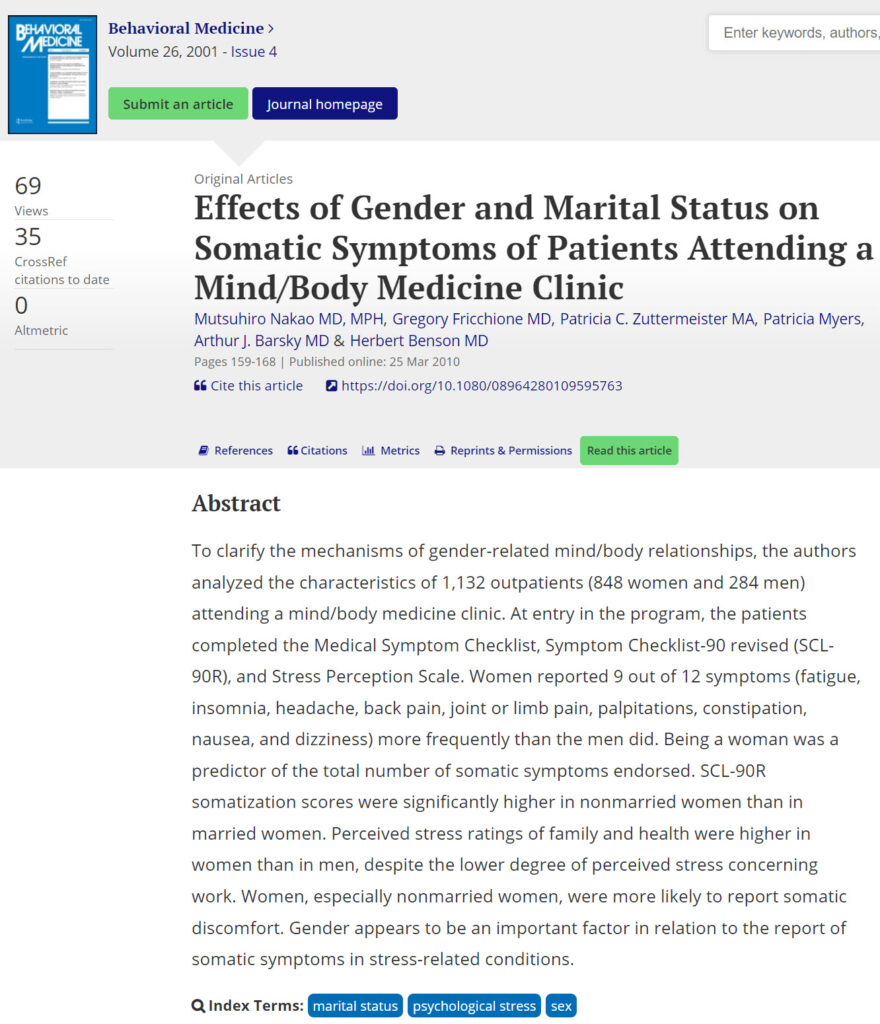To clarify the mechanisms of gender-related mind/body relationships, the authors analyzed the characteristics of 1,132 outpatients (848 women and 284 men) attending a mind/body medicine clinic. At entry in the program, the patients completed the Medical Symptom Checklist, Symptom Checklist-90 revised (SCL-90R), and Stress Perception Scale. Women reported 9 out of 12 symptoms (fatigue, insomnia, headache, back pain, joint or limb pain, palpitations, constipation, nausea, and dizziness) more frequently than the men did. Being a woman was a predictor of the total number of somatic symptoms endorsed. SCL-90R somatization scores were significantly higher in nonmarried women than in married women. Perceived stress ratings of family and health were higher in women than in men, despite the lower degree of perceived stress concerning work. Women, especially nonmarried women, were more likely to report somatic discomfort. Gender appears to be an important factor in relation to the report of somatic symptoms in stress-related conditions.
Effects of gender and marital status on somatic symptoms of patients attending a mind/body medicine clinic
Publication
Behavioral Medicine
Volume 26, Issue 4, pp 159-168
Abstract
Web and Email Links
Related Listings
Journal
PLOS ONE
The relaxation response (RR) is the counterpart of the stress response. Millennia-old practices evoking the RR include meditation, yoga and repetitive prayer. Although RR elicitation is an effective therapeutic intervention that counteracts the adverse clinical effects of stress in disorders including hypertension, anxiety, insomnia and aging, the underlying molecular mechanisms that explain these clinical benefits remain undetermined. To assess rapid time-dependent (temporal) genomic […]
Journal
Behavioral Medicine
This article describes the validation of an Inventory of Positive Psychological Attitudes that has potential relevance to health outcomes and its preliminary testing with chronic pain patients. The inventory taps two attitudinal domains: (1) life purpose and satisfaction and (2) self-confidence during potentially stressful situations. It also provides a total score. The inventory scales, developed using factor analysis, were found to have a strong degree of internal reliability and co […]
Journal
Psychosomatic Medicine
Oxygen consumption, carbon dioxide production, and respiratory rate are significantly decreased during the practice of a new, easily-learned relaxation technique. The elements of the technique are a mental device to prevent distracting thoughts, a passive attitude, decreased muscle tonus, and a quiet environment which is as free of visual and auditory stimuli as possible. Sitting quietly with the eyes either open or closed failed to produce the same changes. These physiologic changes […]

